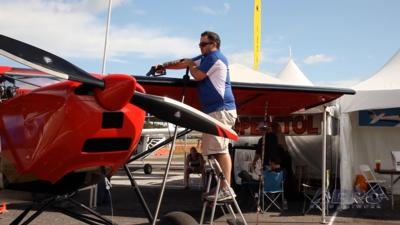Mon, Apr 22, 2024
Inquiry Was Sparked By the University of North Dakota (UND) Aviation Program's Experience
In a significant development impacting piston-engine aircraft operations, Lycoming Engines has released an update on its investigation into valve seat recession observed in engines using UL94 fuel.

The inquiry was sparked by the University of North Dakota (UND) Aviation program's experience after switching its fleet to UL94, a 94-octane unleaded fuel, in June 2023. Despite initial positive outcomes, UND detected abnormal valve seat recession after logging 46,000 flight hours with the new fuel, prompting a return to the traditional 100LL avgas in October.
Lycoming's root cause analysis revealed that while the engine and airframe components meet specifications and are unlikely contributors to the issue, the characteristics of UL94 under certain operational conditions could indeed influence valve seat durability. Key findings suggest that the aromatic concentration in UL94, although not currently regulated by ASTM D7547--the standard specification for hydrocarbon unleaded aviation gasoline--may affect engine valve seats. Higher aromatic levels can alter flame speed and increase particulate abrasiveness, subsequently accelerating valve seat wear.
Responding to these findings, Lycoming is collaborating closely with the FAA to examine how different piston engines respond to variations in fuel aromatics. This partnership aims to refine fuel standards and provide clearer guidelines for aircraft operators on managing fuel use, particularly how leaning techniques could mitigate potential issues associated with high aromatic concentrations.

This investigation is part of Lycoming's commitment under the FAA's Eliminate Aviation Gasoline Lead Emissions (EAGLE) initiative. The project seeks to replace leaded avgas with a high-octane unleaded alternative by 2030, ensuring a safer and more environmentally friendly future for aviation. Through continued research and industry collaboration, Lycoming aims to enhance fuel formulations to prevent mechanical issues and support the aviation sector's transition to unleaded fuels.
More News
Takeoff Roll The process whereby an aircraft is aligned with the runway centerline and the aircraft is moving with the intent to take off. For helicopters, this pertains to the act>[...]
“We’re proud of the hard work that went into receiving this validation, and it will be a welcome relief to our customers in the European Union. We couldn’t be mor>[...]
"Aircraft Spruce is pleased to announce the acquisition of the parts distribution operations of Wag-Aero. Wag-Aero was founded in the 1960’s by Dick and Bobbie Wagner in the >[...]
IDENT Feature The special feature in the Air Traffic Control Radar Beacon System (ATCRBS) equipment. It is used to immediately distinguish one displayed beacon target from other be>[...]
Aero Linx: Pararescue Air Force Pararescuemen, also known as PJs, are the only DoD elite combat forces specifically organized, trained, equipped, and postured to conduct full spect>[...]
 ANN's Daily Aero-Term (05.10.24): Takeoff Roll
ANN's Daily Aero-Term (05.10.24): Takeoff Roll Aero-News: Quote of the Day (05.10.24)
Aero-News: Quote of the Day (05.10.24) Aero-News: Quote of the Day (05.11.24)
Aero-News: Quote of the Day (05.11.24) ANN's Daily Aero-Term (05.11.24): IDENT Feature
ANN's Daily Aero-Term (05.11.24): IDENT Feature ANN's Daily Aero-Linx (05.11.24)
ANN's Daily Aero-Linx (05.11.24)




